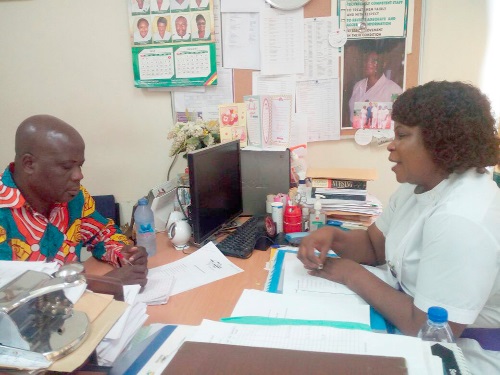
Increase in kidney problems at CCTH Renal Facility
The startling statistics at the Renal Centre of the Cape Coast Teaching Hospital (CCTH) when the Parliamentary Sub Committee on Health paid a visit to the hospital last month to acquaint itself with the developments at the facility, prompted me to make a follow-up visit three days later to know in detail the “actual reality on the ground.”
Advertisement
I had the opportunity to meet the Deputy Director of the centre, Ms Irene Mensah-Jacobs. The statistics she gave which necessitated my return to the hospital was the alarming rate at which the kidney disease is affecting majority of our youth and killing most of them.
Records available at the hospital indicated that there were 2,354 dialysis sessions from January to June this year alone.
The revealing statistics is against 3,057 sessions recorded in the year 2016. The hospital receives an average of 21 sessions daily, a situation which is described as unacceptable.
Some of the causes of this situation have been associated with lifestyle, chronic diseases, illegal mining activities (galamsey) and the abuse of traditional medicine.
My concern in the discussion is how we have engaged in illegal mining activities without recourse to the negative impact it has on us.
Perhaps, when we use chemicals such as cyanide and mercury to break the rock in order to mine gold, we are not aware of the devastating effect these activities have on us immediately and in the future. So we carry out such activities with reckless abandon.
The repercussion of some of these activities is what we have to grapple with as individuals, groups and a nation.
What is more pathetic is that the disease, which was the “preserve” of the elderly, is now plaguing children as young as 12.
The deputy director used the occasion to appeal to the government to exempt taxes on the importation of dialysis consumables to help cater for as many patients as possible.
What was most disturbing in the two-hour discussion was that the people mostly affected by this disease are those between the ages of 12 and 40.
This means that productivity as a nation is gradually being compromised. Most pathetic is the case of a 17-year-old-girl who is very enthusiastic about her education but is now sick, thereby having her dreams of becoming a nurse, a mirage.
Financial constraints
Patients are required to attend three sessions a week at the cost of GH¢ 190 per session. But most of the patients do not attend the sessions regularly due to financial constraints.
“We are losing our patients weekly because of non-accessibility to the facility. They are cash-strapped ”, Ms Mensah-Jacobs said.
She said there were also some patients who did not regulary attend sessions. They reported once a week, instead of three times a week or fortnightly.
There is a huge problem at the renal centre because out of empathy, staff of the hospital mobilise resources to pay for patients who are in distress. There is indeed the need for a more sustainable way of sustaining the facility. And the remedy, among others is to, as a matter of urgency, exempt taxes on consumables for dialysis. There is also the urgent need to make treatment available on the National Health Insurance Scheme (NHIS).
Just as the Heart Foundation in America, there is an urgent need to establish one of such facilities in Cape Coast to cater for the marginalised and deprived people who access the facility from the Western, Central, and Ashanti regions and sometimes La Cote d’ Ivoire.
{loadmodule mod_banners,Nativead1}
Journalist patient
A Journalist, Mr Thomas Cann, who has been suffering from the disease for the past four years, sharing his experience with this writer said the disease had rendered him ineffective at work.
“I have to wake up at dawn, three times a week, for the past three years to queue at the centre to enable me to access the service and return to work,” he said.
He said he had to skip two sessions due to lack of funds .
He said medications that accompanied the treatment were very expensive making it unaffordable for most of the patients and, therefore, appealed to the government to subsidise the cost of the medicine.
The Chairman of the committee, Dr Kwabena Twum-Nuamah, expressed grave concern about advertisements of herbal medicines in the media and on vehicles describing it as “very dangerous to the health of the people “ because most of such preparations had not been tested .
Dr Twum- Nuamah said every medicine had a side effect, hence, the need for the preparation of such drugs to pass through a laborious process in order to have the desired effect.
He underscored the need for the law enforcement agencies to enforce the Act that prevented people from advertising those herbal preparations .
Kidney facts
The main job of the kidneys is to remove toxins and excess water from the blood. Kidneys also help to control blood pressure, to produce red blood cells and to keep bones healthy. Each is roughly the size of the fist and kidneys are located deep in the abdomen, beneath the rib cage. kidneys control blood stream levels of many minerals and molecules, including sodium and potassium, and help to control blood acidity. Every day, they carefully control the salt and water in the body so that the blood pressure remains the same.
Chronic Kidney Disease (CKD) is a progressive loss in kidney function over a period of months or years. Between eight and 10 per cent of the adult population have some form of kidney damage, and every year, millions die prematurely of complications related to Chronic Kidney Disease (CKD).
There is, therefore, the need for the establishment of a national kidney fund to enable as many people as possible to access the facility. Time and tide waits for no one!




